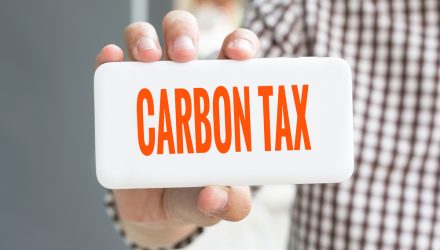Brussels has settled on a carbon border tax to contribute to climate change mitigation efforts, according to the Financial Times.
This will have the dual effect of reducing carbon emissions and raising money to pay off pandemic debts incurred through the European Union.
It will also likely raise the price of carbon allowances in Europe. This could benefit the KraneShares Global Carbon ETF (KRBN), as contracts from the European Union Emissions Trading System (EU ETS) currently comprise 72% of the fund.
CBAM as a Tool to Control Emissions
The EU’s impending Carbon Border Adjustment Mechanism (CBAM) is an attempt to regulate importers that do not adhere to the more stringent carbon emission rules of the EU.
CBAM, which will begin to be implemented gradually starting in 2024, is estimated to be fully operational by 2030. It is estimated the tax will raise around 9 billion euros annually.
The EU ETS strategy involves eventually phasing out free carbon credits and replacing them with CBAM in industries like aviation, to protect against competition and rising costs.
CBAM is one element of a comprehensive plan to reduce emissions in the EU 55% by 2030, as compared to 1990 levels.
It will most likely affect countries that do not have their own national carbon pricing in place and is set up to prevent companies from going outside of the EU in order to avoid current and impending regulations.
The border tax will only target certain imports at first: namely iron, steel, fertilizers, and cement. The application of the tax, however, will likely be expanded.
KRBN Harnessing the EU ETS Transitions
The KraneShares Global Carbon ETF (NYSE: KRBN) tracks the global carbon credits market, including the European cap-and-trade program.
Using the IHS Markit’s Global Carbon Index as a pricing benchmark, the fund tracks the most traded carbon credit futures contracts and “offers for broad coverage of cap-and-trade carbon allowances” per the KraneShares website.
Carbon allowances globally averaged around $24 per ton of carbon dioxide at the end of 2020. Regulators estimate that the number needs to be around $100 per ton in order to enact lasting change. As the allowances continue to go up, KRBN is set to harness that growth and help to incentivize emission reduction.
The expense ratio for KRBN is 0.79%.
For more news, information, and strategy, visit the China Insights Channel.

